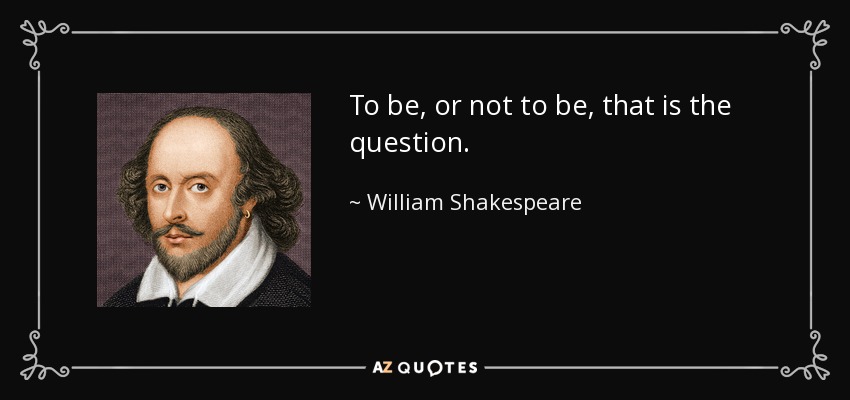

The speech and the line reflect some of the existential questions that Hamlet the play and Hamlet the character are interested in. It marks the beginning of Hamlet's 'To be or not to be' speech which is a soliloquy. It's also important to note that when he says "'tis nobler in the mind to suffer," he's probably not saying that it's more noble in his mind, his opinion, - he's saying that it's noble to suffer these hardships in his mind, that is, to accept and endure them psychologically, not just physically. 'To be or not to be' is one of the most famous lines in all of English literature. Perhaps because he has to risk his life to kill Claudius, and he might die trying? But it's not entirely clear why fighting against these hardships might kill Hamlet. And fighting them will put an end to those troubles, as well as, potentially, an end to Hamlet himself, if the fighting proves dangerous. His exact words are, "by opposing end them" - so the alternative to putting up with all his troubles is to oppose them, or fight them. SARAH: Well let's not be too hasty here, Ralph. After all, he's asking whether or not it's better, or nobler, to put up with the troubles that life has thrown his way, or simply end them by dying. RALPH: We can imagine that Hamlet is returning to the theme of his first soliloquy - a suicide wish. Hovering above the text (or lurking beneath it) is the idea that suicide could be an option, too.SARAH: In this opening line Hamlet directly states the decision he faces: "To be or not to be" - to live or die, to exist or to stop existing. The speech is about putting up (and choosing life), or not putting up (and maybe choosing death), and the implications of this choice in the next world and this one. However, as you say, there is some shadow of suicide in the words of the first line too and this shadow comes to life when the “bare bodkin” is mentioned later. So the dilemma is to put up, or to take action and this is set out clearly at the start. The meaning remains, imho, the clear and patent one, rather than a reference to suicide. Or, if the sea were metaphorically inside him, and were an interior enemy, he would need to make that clear, which he does not do. The natural meaning of “take arms against a sea of troubles” etc is to battle some exterior force to grab weapons to do battle against the sea which is out there, not here, and certainly not inside us. As a result of killing Claudius, Hamlet might well die himself. to take up arms, to fight, and possibly, within the context of the plot, to kill Claudius. He means that there are two options for him: these options are: in lines 2-3, to put up with random unpleasantness from Claudius and others in lines 4-5, to actually do something, viz. Hamlet tells us what the speech is about in lines 2-5, where he explains what he means by “To be or not to be”. Whether we hear Laurence Olivier reciting them, or erroneously picture some other great Shakespearean actor pronouncing these words while holding a skull (which actually belongs in the later gravedigger scene), ‘To be or not to be’ is one of the most famous six-line phrases from all of English literature. Virtually everyone knows the line, ‘To be, or not to be: that is the question’. With this regard their currents turn awry Is sicklied o’er with the pale cast of thought,Īnd enterprises of great pitch and moment Thus conscience does make cowards of us all, The undiscover’d country, from whose bournĪnd makes us rather bear those ills we have With a bare bodkin? Who would fardels bear,īut that the dread of something after death,

The pangs of dispriz’d love, the law’s delay, Th’oppressor’s wrong, the proud man’s contumely, When we have shuffled off this mortal coil,įor who would bear the whips and scorns of time, To sleep, perchance to dream-ay, there’s the rub:įor in that sleep of death what dreams may come, That flesh is heir to: ’tis a consummation The heart-ache and the thousand natural shocks

Or to take arms against a sea of troublesĪnd by opposing end them. The slings and arrows of outrageous fortune, Whether ’tis nobler in the mind to suffer To be, or not to be, that is the question:


 0 kommentar(er)
0 kommentar(er)
